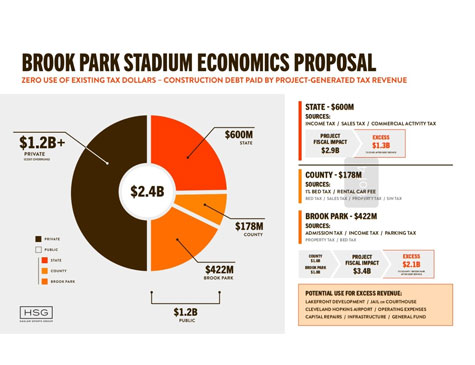As Browns Detail Brook Park Funding, Ronayne Remains Optimistic About Downtown Talks
by Dillon Stewart | Feb. 14, 2025 | 12:30 PM

The article is published as part of an exclusive content-sharing agreement with neo-trans.blog.
Active discussions between the city of Cleveland, Cuyahoga County and the owners of the Cleveland Browns are back on for the $1.2 billion renovation of the city-owned, 1999-built stadium on Downtown Cleveland’s lakefront, Cuyahoga County Executive Chris Ronayne told NEOtrans in an interview Thursday.
Sources at the pro football team and their majority owner, the Haslam Sports Group, acknowledged the lakefront conversations are happening again with Ronayne, Cleveland Mayor Justin Bibb and their staffs, describing them as “productive” compared to having little or no interaction just two months ago.
But the Browns and HSG are still pressing ahead with plans to build a $2.4 billion enclosed stadium plus associated development in suburban Brook Park, including meeting with members of the media today. A copy of their media backgrounder is posted here. HSG is owned by Jimmy Haslam and and his wife Dee Haslam.

Ronayne says that “active” conversations are happening. It points to a thawing of what was a frosty relationship in the waning months of 2024 between HSG and Ronayne plus Bibb. Both the city and HSG filed lawsuits against each other.
Ronayne told NEOtrans he is “optimistic” about the conversations he and Bibb are having with HSG regarding the existing stadium that could be redesigned with everyday hospitality uses as well as potential lakefront development sites nearby that could include lands to the west of the stadium and the Municipal Parking Lot east of East Ninth Street.
HSG representatives said that closing Burke is a complex process with an aggressive timeline being five to seven years. The Haslams said that for every year construction is delayed could add $100 million to $150 million in stadium construction costs.
Conversely, if HSG is able to move forward with the Brook Park site, the team source said HSG would support the city’s lakefront redevelopment plans, minus the stadium, including via the expenditure of private funds.
The pivot point for where further stadium planning will be focused is when state lawmakers begin finalizing the state’s operating budget for the next two years. Although the budget has to be approved by the legislature before the start of the state’s fiscal year on July 1, it typically starts to crystalize by April.
HSG is seeking $600 million from the state for its Brook Park stadium and $600 million from the city/county. The state contribution would be far less for the lakefront stadium renovation with the city/county offering $461 million. Private sources would fund about half of the total regardless of location.
HSG’s favored state funding mechanism was a $600 million bond issue serviced by state taxes generated by the Brook Park stadium and nearby developments. It would allow the Brook Park stadium to get the state funding up front. It might also put the state and local governments on the hook if stadium tax revenues were insufficient.
Instead, Gov. Mike DeWine proposed a new Sports Facilities Construction and Sports Education Fund that could be funded by doubling the state’s sports betting tax rate to 40 percent. The permanent tax increase could generate $130 million to $180 million per year in new revenue — with the lower-end estimate being more likely.
But, as proposed, the revenue could not be used to service debt on a bond issue. That means $600 million up-front in state money might not be possible.
HSG has to get a new stadium under construction by mid-2026 for it to be completed in time for the 2029 National Football League (NFL) playing season which starts in August of each year. The Browns’ lease at the lakefront stadium ends after the 2028 NFL season.
DeWine has proposed funding awards for sports education and facilities would be made by a new commission appointed by the governor and the state legislature. New or renovated stadiums for professional sports would compete with funding for school/community sports/recreation programs and facilities.
“The model we’ve proposed on the state level would leverage only the incremental tax revenues from within the (Brook Park) development itself to enable the project,” said Dave Jenkins, HSG’s chief operating officer said in a recent press statement. The funding practice is commonly called “value capture.”
DeWine’s stadium funding proposal is agnostic as to location — it doesn’t pick a winner among Cleveland or Brook Park in this emotionally charged contest. But that doesn’t mean HSG has given up on securing Brook Park-specific financing from the state.
“We continue to work with the appropriate stakeholders and other experienced experts to develop alternative funding mechanisms for an enclosed Huntington Bank Field in Brook Park, knowing the importance of not tapping into existing taxpayer funds that go to other pressing community needs,” Jenkins added.

Dillon Stewart
Dillon Stewart is the editor of Cleveland Magazine. He studied web and magazine writing at Ohio University's E.W. Scripps School of Journalism and got his start as a Cleveland Magazine intern. His mission is to bring the storytelling, voice, beauty and quality of legacy print magazines into the digital age. He's always hungry for a great story about life in Northeast Ohio and beyond.
Trending
-
1
-
2
-
3
-
4
-
5










